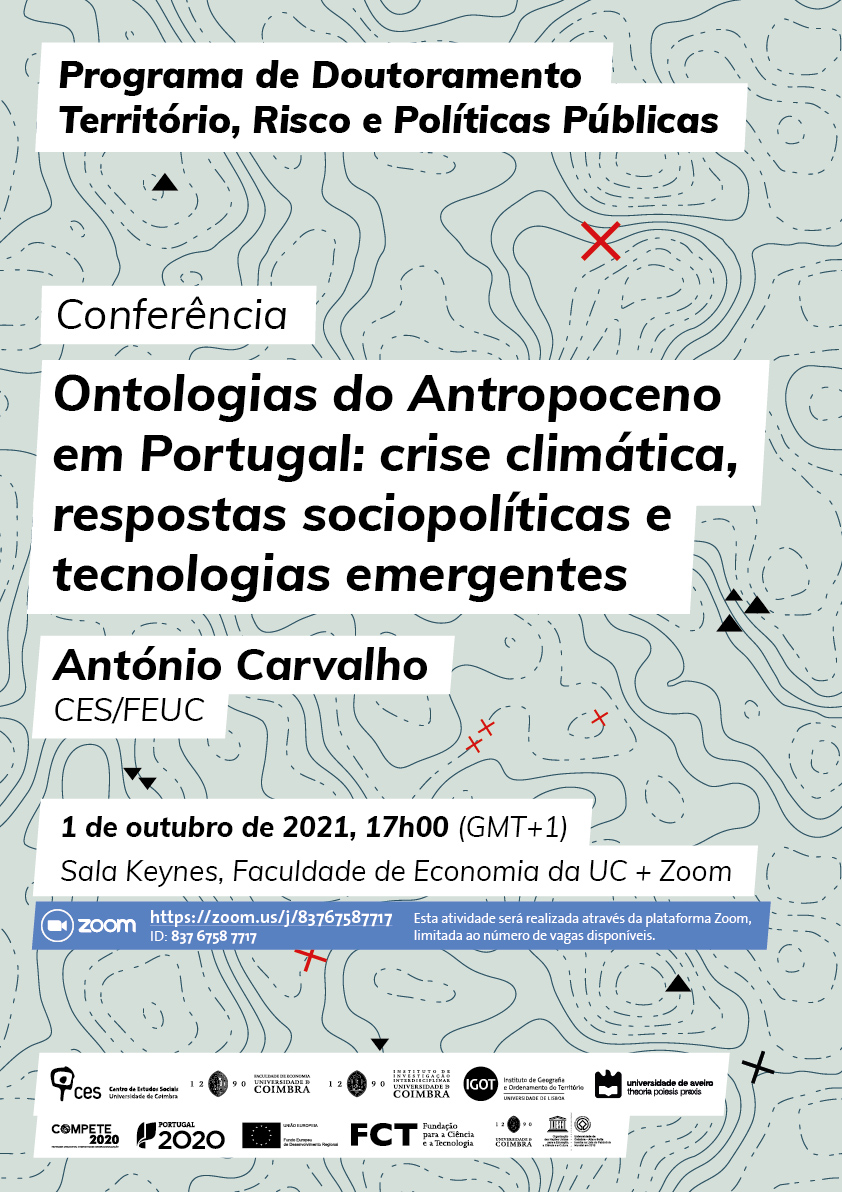Lecture | Doctoral Programme «Territory, Risk and Public Policies»
Ontologies of the Anthropocene in Portugal: climate crisis, socio-political responses and emerging technologies
António Carvalho (CES/FEUC)
October 1, 2021, 17h00 (GMT+1)
Keynes Hall, Faculty of Economics - UC + Zoom
Link ZOOM> https://videoconf-colibri.zoom.us/j/83767587717 | ID: 837 6758 7717
About
In this presentation I will reflect on how the climate crisis is articulated with governance devices that encompass a heterogeneous set of dimensions and actors, including social movements, bodies, national carbon neutrality strategies and emerging technologies. This paper results from research work carried out within the TROPO project, currently running at the Centre for Social Studies, and will explore three case studies: the Transition Movement (TM) in Portugal; The Roadmap to Carbon Neutrality 2050 (RNC2050) and Geoengineering. The empirical data includes 20 semi-structured interviews with members of the TM; six focus groups and one deliberative forum on Geoengineering; 20 semi-structured interviews with various stakeholders involved in the preparation, implementation and public reception of the RNC2050.
Drawing on literature in the field of science and technology studies, and based on the characterization of various climate crisis response models, instruments and their characteristics, I will reflect on the multiple ontological politics of the Anthropocene, arguing that this controversial geological epoch can be interpreted as a governance device that aims to reconfigure multiple spheres of the relationship between humans, non-humans and Planet.
Keywords: Anthropocene; Climate Change; Ontology; Science and Technology Studies
Bio note
António Carvalho completed his PhD in Sociology in 2014 at the University of Exeter, under supervision of Andrew Pickering. He is currently Visiting Assistant Professor at the department of Sociology of the Faculty of Economics of the University of Coimbra and researcher at the Centre for Social Studies, where he coordinates the project TROPO: Ontologies of the Anthropocene in Portugal - Social Movements, Public Policies and Emerging Technologies. He has conducted research on the history and social dimensions of nuclear energy, public engagement with emerging technologies, global health partnerships and social studies of meditation. His research interests include biopolitics, Anthropocene, Mindfulness, posthumanist theory and affect. His work is published in journals including Public Understanding of Science, Subjectivity, Nanoethics, Minerva, Globalization and Health and The Sociological Review.
________________________________
This activity will be accessible through the Zoom platform and will be limited to number of available places.
We appreciate that all participants keep the microphone muted until the moment(s) of debate. The host of the session reserves the right to expel the participant who does not respect the rules of the room.
Online open access activities such as this one do not grant a declaration of participation since such document will only be provided in events that provide for prior registration and controlled access.


